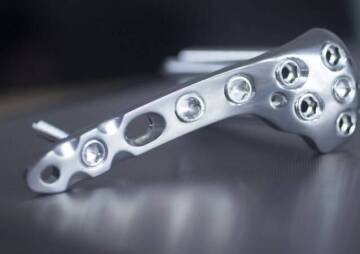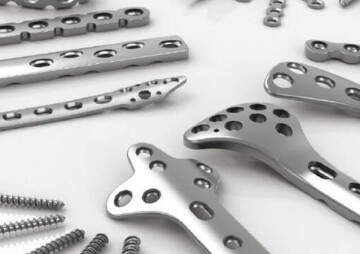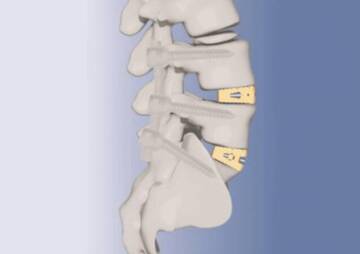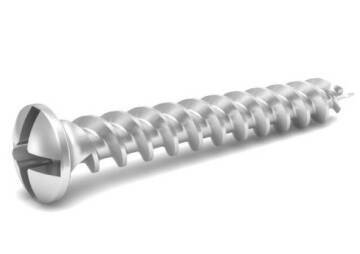-
Category
Craniomaxillofacial Surgery
Orthopedic Surgery
Spine Surgery
Orthopedic Implants
Hip Surgery
Knee Surgery
Pectus Excavatum
Bone Graft
Disinfectants
Healthcare
The Body's Reaction to a Variety of Foreign Materials

Some of the common symptoms of body responses to implants can be the allergic reaction, which is reasonably suspected after the implant placement. In this context, we explain the different body responses to implants on various foreign materials.
We all have different body systems, and our body can be allergic or even show a specific reaction to foreign materials that is different from the other individuals.
So our body response to implants is different from person to person, some are minor, and some may not. The only normal body reaction to the foreign implants can be macrophages and the giant foreign body cells located at the surface of the implant and has subjacent fibroblastic proliferation and collagen deposition.
In this context, we explain the different body responses to implants on various foreign materials such as bio-implants, PEEK, titanium, and we enlighten you with the body response to the implants. This content notes that there are even cases where the body rejects the plates and the screws.
What Are the Implant Reaction Symptoms?
Some of the common symptoms of body responses to implants can be the allergic reaction, which is reasonably suspected after the implant placement.
It is based on symptoms that are associated with allergies in the form of rashes, urticarial, pruritus, swelling in the region of the orofacial, erythema of facial as well as oral, eczematous lesions in the area of the cheeks. There is also tissue response to implants, such as the hyperplastic lesions of the soft tissues. Allergy testing is mandatory in these cases mentioned.
What Are the Body Response Symptoms?
Over some time, you may see symptoms of body response to implants. By the passage of time, your body becomes sensitized to the reaction, and when it comes to the stage later in your life when you need an implant that contains nickel, PEEK, or metals, the immune system of the body sees it as nickel and rejects the implants.
You can know your body is rejecting the implant by the signs and the symptoms of the metals hypersensitivities ranging from small and localized to even severe and generalized in cases. You can see limited reactions that appear on the dermatitis of the contact on the skin exposed to the metal transplant. There can be signs such as skin being red, swollen, and even get itchy. You can even see the development of the hives and the rashes on the skin.
Why Would an Implant Fail?
The implants can fail due to many reasons that can include the failure of the integration, fracture of the respective implant, malposition of the implant that causes damages to the vital structure, and even the advanced bone around the integrated loaded implant.
According to many clinics, the implants fail to fall under two categories:
- the early failure that occurs before the Osseointegration of the implant,
- and the second is the late failure that occurs after the integration and loading after the implant.
Few patients report the implant rejection symptoms, especially the one for the titanium after the implant placement. The tissues can even have a systemic response to the issues that occur towards the implants that have an aspect of biocompatibility.
What Are Biomaterials?
Biomaterials play a significant and vital role in medicine and restoring and facilitating healing for individuals after any disease or injury.
The nature of the biomaterial can be natural or synthetic. It is mainly used to support and enhance or even replace the damaged tissue along with a biological function.
In the modern field of biomaterials, it combines medicines, biology, physics, and chemistry. It has recent influences from the engineering of the tissue and the materials of science. Materials such as metals, ceramic, plastics, glass, and some cases, even the living cells and the tissues are being used to create biomaterials.
These biomaterials can be later molded or be made as machine parts like films, foams, fabrics, and coating and be used in the products of biomedical. We can add that in the biomaterials' materials, PEEK is a very suitable biomaterial for spine implants and orthopedics and can be converted into parts of the implant by standard processing of polymer.
The List of Metallic Biomaterials
Many metallic biomaterials are used for medical purposes. The following is the list of some metallic biomaterials.
- Collage: It is used to apply the bones, cartilage, heart, ligaments, nerves, and vasculature.
- Fibrin: Fibrin is applied to the cartilage, nerves, and vasculature.
- Silk: It is used for the application on the bones, cartilage, and the liver.
- Agarose, which is a polysaccharide-based biomaterial: It is used for the cartilage, heart, and nerve applications.
- Alginate: It is used for the application on the cartilage, liver, nerves, and vasculature.
- Hyaluronan: Hyaluronan is applied for the adipose, cartilage, nerves, and the skin along with the vasculature.
- Chitosan: It is suitable for the application on the bones, cartilage, skin, and nerves.
Titanium has become a biomaterial for facial osteosynthesis. As it is highly biocompatible, and it has corrosion resistance. Still, the titanium's behavior inside the body of the individual after the process of bone fixation is not documented, but it has not shown much body reaction.
What Are the Foreign Body Reaction Treatments?
As a result of implants, there is a lot of systematic reactions that are difficult to treat. Sometimes your surgeon may find it better to remove implants. Sometimes your surgeon may find it better to remove the implant when there is an option for a non-metal replacement process.
If the reaction has been because of the hip or a knee replacement, then the non-metal operation is rarely done as it is difficult to replace the joints. The use of metal is mandatory in many cases. Hence, to avoid reactions and allergies, the doctors take some hypersensitivity tests before choosing the implant and the material for you.
According to the different body types that we have, the symptoms and the reactions to the implants vary from person to person. You may face redness, itching, and swollen skin, whereas someone else may face different symptoms. Body responses to the implants are different, and so if you notice any symptom, it is better to consult with the respective doctors as early as possible.
The body can reject plates and screws as your body has no material, but titanium as a biomaterial for implants and PEEK is safe and has few complaints so far.







A lot of informations but nothing going straight to the point as if avoiding to really talk about the side effects of metallosis to allow the continuation of those practices to the expense of patients optimal health or sicknesses.